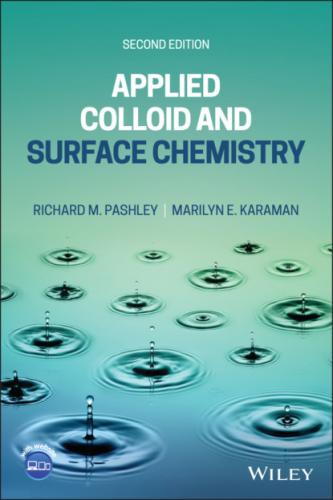222 223
223 224
224 225
225 226
226 227
227 228
228 229
229 231
230 232
231 233
232 234
233 235
234 237
235 238
236 239
237 240
238 241
239 242
240 243
241 244
242 245
Applied Colloid and Surface Chemistry
Second Edition
RICHARD M. PASHLEY
University of New South Wales CanberraAustralia
MARILYN E. KARAMAN
University of New South Wales CanberraAustralia
This second edition first published 2021
© 2021 John Wiley & Sons Ltd
Edition History John Wiley & Sons Ltd (1e, 2004)
All rights reserved. No part of this publication may be reproduced, stored in a retrieval system, or transmitted, in any form or by any means, electronic, mechanical, photocopying, recording or otherwise, except as permitted by law. Advice on how to obtain permission to reuse material from this title is available at http://www.wiley.com/go/permissions.
The right of Richard M. Pashley and Marilyn E. Karaman to be identified as the authors of this work has been asserted in accordance with law.
Registered Offices John Wiley & Sons, Inc., 111 River Street, Hoboken, NJ 07030, USA John Wiley & Sons Ltd, The Atrium, Southern Gate, Chichester, West Sussex, PO19 8SQ, UK
Editorial Office The Atrium, Southern Gate, Chichester, West Sussex, PO19 8SQ, UK
For details of our global editorial offices, customer services, and more information about Wiley products visit us at www.wiley.com.
Wiley also publishes its books in a variety of electronic formats and by print‐on‐demand. Some content that appears in standard print versions of this book may not be available in other formats.
Limit of Liability/Disclaimer of Warranty In view of ongoing research, equipment modifications, changes in governmental regulations, and the constant flow of information relating to the use of experimental reagents, equipment, and devices, the reader is urged to review and evaluate the information provided in the package insert or instructions for each chemical, piece of equipment, reagent, or device for, among other things, any changes in the instructions or indication of usage and for added warnings and precautions. While the publisher and authors have used their best efforts in preparing this work, they make no representations or warranties with respect to the accuracy or completeness of the contents of this work and specifically disclaim all warranties, including without limitation any implied warranties of merchantability or fitness for a particular purpose. No warranty may be created or extended by sales representatives, written sales materials or promotional statements for this work. The fact that an organization, website, or product is referred to in this work as a citation and/or potential source of further information does not mean that the publisher and authors endorse the information or services the organization, website, or product may provide or recommendations it may make. This work is sold with the understanding that the publisher is not engaged in rendering professional services. The advice and strategies contained herein may not be suitable for your situation. You should consult with a specialist where appropriate. Further, readers should be aware that websites listed in this work may have changed or disappeared between when this work was written and when it is read. Neither the publisher nor authors shall be liable for any loss of profit or any other commercial damages, including but not limited to special, incidental, consequential, or other damages.
Library of Congress Cataloging‐in‐Publication Data
Names: Pashley, Richard M., author. | Karaman, Marilyn E., author.
Title: Applied colloid and surface chemistry / Richard M. Pashley, University of New South Wales Canberra, Canberra, Australia, Marilyn E. Karaman, University of New South Wales Canberra, Canberra, Australia.
Description: Second edition. | Hoboken, NJ : Wiley, 2021. | Includes bibliographical references and index.
Identifiers: LCCN 2021031901 (print) | LCCN 2021031902 (ebook) | ISBN 9781119739128 (paperback) | ISBN 9781119740001 (adobe pdf) | ISBN 9781119740018 (epub)
Subjects: LCSH: Colloids. | Surface chemistry.
Classification: LCC QD549 .P275 2021 (print) | LCC QD549 (ebook) | DDC 541/.345–dc23
LC record available at https://lccn.loc.gov/2021031901 LC ebook record available at https://lccn.loc.gov/2021031902
Cover Design: Wiley
Cover Image: © Photo‐Max/E+/Getty Images
Those that can, teach.
Sit down before fact as a little child, be prepared
to give up every preconceived notion, follow
humbly wherever and to whatever abysses nature
leads, or you shall learn nothing.
Thomas Henry Huxley (1860)
Preface
The first edition of this book was written following several years of teaching this material to third year undergraduate and honours students in the Department of Chemistry at the Australian National University in Canberra, Australia. Science students are increasingly interested in the application of their studies to the real world, and colloid and surface chemistry is an area which offers many opportunities to apply learned understanding to everyday and industrial examples. There is a lack of resource materials with this focus, and so we produced the first edition with many industrial examples.
This second edition extends this to include several more recent and topical industrial innovations. It is still intended to take chemistry or physics students with no background in the area to the level where they are able to understand many natural phenomena and industrial processes and are able to consider potential areas of new research. It involves the study of the interaction between solids, liquids and gases and their application to numerous everyday processes.
